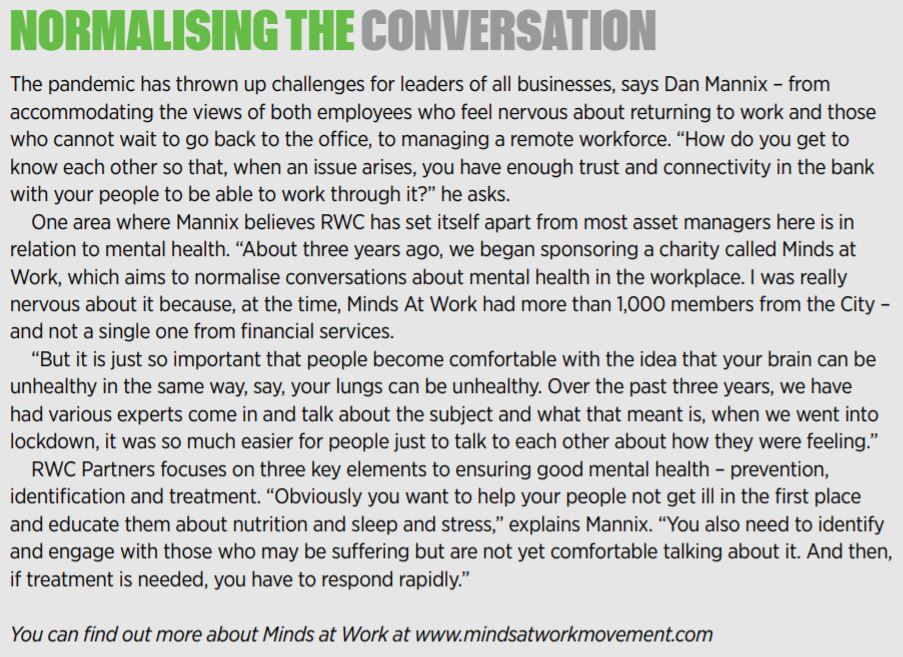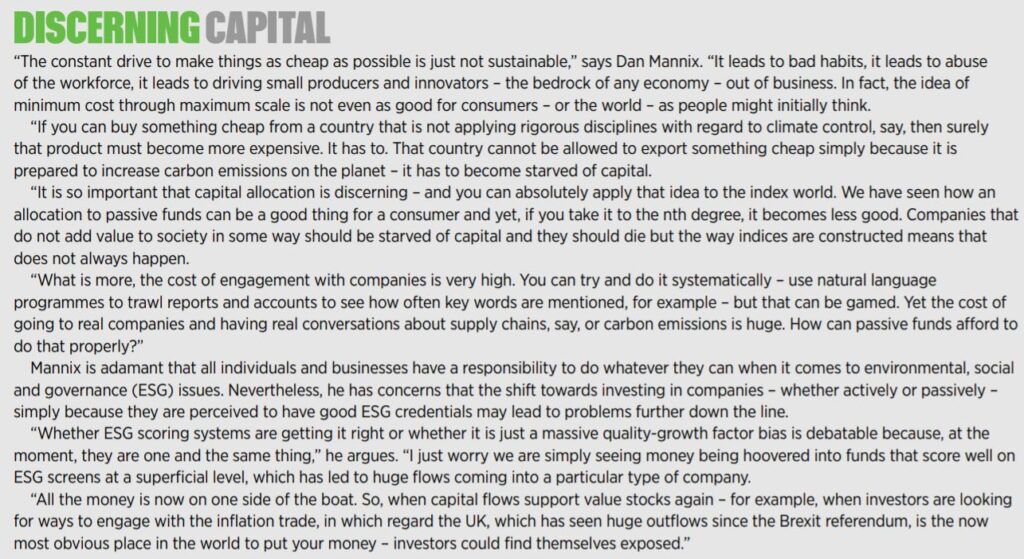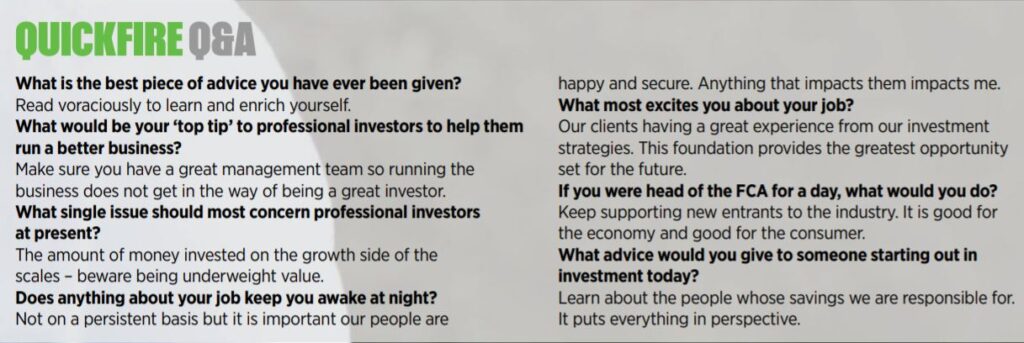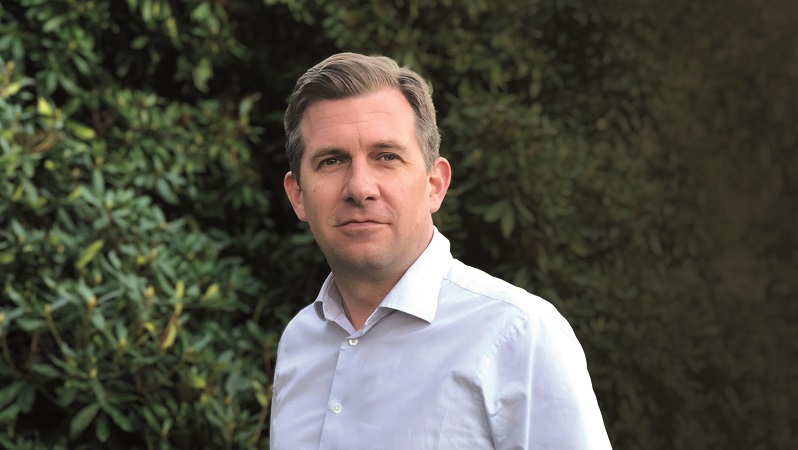The importance of investors taking a long-term view has become something of an asset management cliché and yet, when it comes to their own behaviour, suggests RWC Partners CEO Dan Mannix, businesses tend to be less good at practising what they preach.
“The asset management sector serially lets down the consumer with its lack of longevity,” he says. “Far too often clients need to revisit a decision for some reason other than the strategy they have invested in – whether because of a change of manager, a company merger or whatever. That is why, at RWC, our mission has been to build an organisation that is multi-generational and whose longevity matches – or exceeds – the duration over which our clients want us to manage money for them.”
What does Mannix see as the key elements in realising such an ambition? “It starts with having shareholders who understand the commitment you have to your clients and management teams,” he replies. “You cannot have a shareholder who wants to strip the balance sheet, take all the money out in dividends, avoid paying their people properly or change the terms on which people have come into the organisation.
“Ultimately, these things are defined by the shareholders so managing their expectations is incredibly important – and sometimes you are just too late. As a chief executive, you can come into an organisation and inherit existing shareholder expectations that are not aligned with clients and management teams. It is then really hard work to realign them because that generally involves a lower return for shareholders.”
Mannix cites the privately owned Baillie Gifford as “an obvious example” of aligned interests. “That is not to say the partners won’t have differences of opinion but fundamentally, as owners of that business, they want it to be multi-generational,” he adds. “A lot of the time, these businesses will be private but there are organisations that have listed with modest expectations about the future and so can attract the right sort of shareholder.”
Next up, says Mannix, who left JP Morgan Asset Management to join RWC as head of business development in 2006, is “an agreement with fund managers that stands the test of time”. “One thing fund managers hate is having their remuneration dictated to them by different people over the course of their careers. They just want to be remunerated on what they do for their clients and how successful they are in that.”
This is not just a question of money, stresses Mannix, however – it also involves looking to create an appropriate environment for fund managers to operate most effectively. “We cannot offer our fund managers stability if they do not trust the organisation,” he adds. “So that is critically important – and then the final point is to ensure the business has independent oversight from people who have something to lose.”
A question of governance
“This is essentially a question of governance as, while people clearly enjoy being part of an organisation that is moving forward, what happens when things go wrong? How do they behave? What are their options? How does a director signal they are feeling uncomfortable about something? Really, you signal that by leaving and there being no good explanation as to why you have left other than you were uncomfortable about staying.
“If you want to run a great organisation that can match your clients’ duration, you just cannot compromise on those three things. And if you do compromise – by locking in your fund managers, say – you are basically just pretending. Of course there will be friction in any organisation investing in people but, rather than locking them in, your focus has to be on creating a great environment for the ones who are creating value.”

Mannix’s wish to attract “the right sort of shareholder” rose to the top of his to-do list two years ago when Schroders sold the significant stake it had held in RWC since 2010. Staff bought back 20% of the company’s share capital themselves while RWC struck a deal with Boston-based Lincoln Peak Capital whereby it would take a 27% stake in the business and commit to holding it for at least a decade.
“Lincoln Peak is what is known as a ‘permanent capital vehicle’ and this is so important,” says Mannix. “It is not private equity. It is not a fund that needs an exit because it closes in three or five years’ time. It has more in common with an investment trust – only it is a private vehicle in the US that is run by two guys, who are experts in managing and owning stakes in private asset managers over the long term.
“The critical point about permanent capital is it is focused on income and so will not change the way the businesses it owns are run. The most overlooked element in any analysis of fund managers is the ownership structure of the organisation they work for. It is virtually never mentioned – yet, when a business gets hollowed out of its great people, how often do you find the catalyst is an unsatisfactory ownership structure?
“So, when Schroders left, I was absolutely determined to find someone who, along with the chairman and the board, would help hold me to account and offer our fund managers an outlet if I was not doing a good job for them and for our clients. Chief executives and, more often, fund managers have huge commercial importance to an organisation and so, if an individual loses their polar north, it can be a recipe for disaster.
“This leads us to spend a lot of time thinking about our priorities – is it our clients, our staff, our shareholders? Increasingly, is it the community we live in or the world? How do you put these in an order? And actually, we have largely decided you cannot. Instead, you accept there will be conflicts between these different interests and you take on the challenge of resolving them so you reach the best overall outcome for everyone.”
Considerations of personnel
RWC, whose managers now run some $25bn (£20bn) of assets for a range of clients around the world, is unusual for a business of its size in that its reach is arguably driven more by considerations of personnel than geography or distribution channel.
“Our biggest single market is UK fund buyers, with whom we have been working for 20 years,” says Mannix. “The other part of our client base is large, complex institutional investors. We have well over 100 institutional clients in the US, we have pensions clients in Europe and Australia and we have a significant number of large sovereign wealth funds throughout the world. UK fund selectors and their clients know they will receive exactly the same products and service as every other one of our clients around the world.
“The reason we are in Australia, in the US, in the Middle East with sovereign wealth funds is because we have recruited people who are highly respected in those markets – just as the reason we are in the UK is because, over the years, we have recruited highly respected managers in that space. Asset management companies are typically started by a particular manager in a particular channel and then the business builds within that channel.
“So they recruit managers who reinforce the channel but you then risk becoming ‘landlocked’ because, taking Europe as an example, the size of the markets basically mean single-channel managers tap out at between £30bn and £50bn – and that is if you have done seriously well. We can all think of examples of UK businesses that have totally saturated their market and then found they have no other avenues to pursue.
“Developing a non-domestic retail business or a global institutional business is mind-blowingly hard – unless you have world-class investment capabilities that can compete on a global stage. Unusually, we have tapped into both the UK retail and global institutional markets and that affords us the opportunity to continue to develop and attract teams like Nick Clay’s [from BNY Mellon] that sit on a global stage – albeit with a huge UK presence.”
Existential crisis
Whichever markets RWC is drawn to by it personnel, Mannix is keen to ensure the company never ends up competing with its clients. “Large asset managers now face an existential crisis because they have shareholders who are used to them running with margins of 30% to 40% that, back in the day, could be maintained or grown,” he begins by way of explanation. “The problem today, however, is the savings environment is not offering them the same opportunities to do that. So what do you do? You could hide that reality by merging and stripping out costs – although what companies tend not to mention when they pull that particular lever is they are also restricting the degree to which their investment teams can recruit and the amount of money they can spend on research.
“Both of those things are fundamentally bad for the consumer, who is paying fees to a fund manager to invest in managing their money – not to spend millions, say, advertising their latest strategy on the side of a bus. In the institutional world, you cannot get away with not reinvesting a significant amount of your fees into your investment capability. In the mass-market, retail world, you can.
“Still, if you do not want, or need, to go down the M&A route, what other choices do you have? Take a look at financial services companies in the FTSE 100 these days and it’s not, say, HSBC that stand out, but St James’s Place. The reason for that is, manufacturing piece aside, they own the value chain and the end-client and that is leading some mid-market asset managers to conclude they should compete with their biggest clients.
“So you now see a plethora of wealth managers who are looking to co-ordinate the savings activities from financial advisers and the end-consumer. I would view RWC launching a fund or a service that directly competed with our biggest and most trusted clients as a huge risk. We prefer to see our role as very much a service provider to those who are providing a service to the end-consumer.”

Back to the future
Asked how he sees the asset management sector evolving over the next decade, Mannix chooses first to look back in time. “The funny thing is, although everything changes, so much stays the same,” he says. “When I first came into the industry in 1999, for example, value managers were going out of business and clients were basically buying technology funds or US trackers.
“It may sound an odd thing to say but there is something reassuring about people writing about ‘the death of value investing’ or ‘the death of the fundamental stockpicker’ as that provides the opportunity for value investors and fundamental stockpickers to do their job. At the same time, though, the world will continue to invent new assets and new ways to invest – some of which people will need to be very careful about.
“If you think about it, the late 1990s was also the beginning of algorithmic trading and fundamental decision-makers were supposedly going to be eaten alive by machines. The reality is we continue to augment fundamental risk management and decision-making with computer technology and, while access to information improves so, more importantly, does our ability to sort and filter that information to identify opportunities.
“The industry does need to continue to drive down costs – and then there could be some really exciting developments. Is it possible mutual funds could migrate to become actively managed ETFs because they have a live price and are better for app-based technology and visualising performance? Entirely. Is it possible we will be settling trades on the same day we make them rather than having to wait two or three days? Absolutely.
“There will be some fabulous innovations in financial services, including aggregators being able to access banking and savings data so you can pull it all into one place. Still, as specifically relates to our business, while the assets being invested in may change, I do not see the need for skilled investors in difficult-to-access assets that require oversight or governance and risk management going away.”

This interview first appeared in the March 2021 issue of Portfolio Adviser magazine










